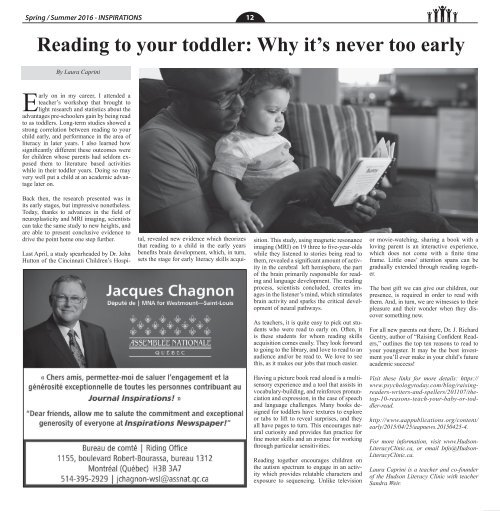INSPIRATIONS
Inspirations_summer-160418
Inspirations_summer-160418
You also want an ePaper? Increase the reach of your titles
YUMPU automatically turns print PDFs into web optimized ePapers that Google loves.
Spring / Summer 2016 - <strong>INSPIRATIONS</strong> 12<br />
Reading to your toddler: Why it’s never too early<br />
By Laura Caprini<br />
Early on in my career, I attended a<br />
teacher’s workshop that brought to<br />
light research and statistics about the<br />
advantages pre-schoolers gain by being read<br />
to as toddlers. Long-term studies showed a<br />
strong correlation between reading to your<br />
child early, and performance in the area of<br />
literacy in later years. I also learned how<br />
significantly different these outcomes were<br />
for children whose parents had seldom exposed<br />
them to literature based activities<br />
while in their toddler years. Doing so may<br />
very well put a child at an academic advantage<br />
later on.<br />
Back then, the research presented was in<br />
its early stages, but impressive nonetheless.<br />
Today, thanks to advances in the field of<br />
neuroplasticity and MRI imaging, scientists<br />
can take the same study to new heights, and<br />
are able to present conclusive evidence to<br />
drive the point home one step further.<br />
Last April, a study spearheaded by Dr. John<br />
Hutton of the Cincinnati Children’s Hospital,<br />
revealed new evidence which theorizes<br />
that reading to a child in the early years<br />
benefits brain development, which, in turn,<br />
sets the stage for early literacy skills acquisition.<br />
This study, using magnetic resonance<br />
imaging (MRI) on 19 three to five-year-olds<br />
while they listened to stories being read to<br />
them, revealed a significant amount of activity<br />
in the cerebral left hemisphere, the part<br />
of the brain primarily responsible for reading<br />
and language development. The reading<br />
process, scientists concluded, creates images<br />
in the listener’s mind, which stimulates<br />
brain activity and sparks the critical development<br />
of neural pathways.<br />
As teachers, it is quite easy to pick out students<br />
who were read to early on. Often, it<br />
is these students for whom reading skills<br />
acquisition comes easily. They look forward<br />
to going to the library, and love to read to an<br />
audience and/or be read to. We love to see<br />
this, as it makes our jobs that much easier.<br />
or movie-watching, sharing a book with a<br />
loving parent is an interactive experience,<br />
which does not come with a finite time<br />
frame. Little ones’ attention spans can be<br />
gradually extended through reading together.<br />
The best gift we can give our children, our<br />
presence, is required in order to read with<br />
them. And, in turn, we are witnesses to their<br />
pleasure and their wonder when they discover<br />
something new.<br />
For all new parents out there, Dr. J. Richard<br />
Gentry, author of “Raising Confident Readers,”<br />
outlines the top ten reasons to read to<br />
your youngster. It may be the best investment<br />
you’ll ever make in your child’s future<br />
academic success!<br />
Having a picture book read aloud is a multisensory<br />
experience and a tool that assists in<br />
vocabulary-building, and reinforces pronunciation<br />
and expression, in the case of speech<br />
and language challenges. Many books designed<br />
for toddlers have textures to explore<br />
or tabs to lift to reveal surprises, and they<br />
all have pages to turn. This encourages natural<br />
curiosity and provides fun practice for<br />
fine motor skills and an avenue for working<br />
through particular sensitivities.<br />
Reading together encourages children on<br />
the autism spectrum to engage in an activity<br />
which provides relatable characters and<br />
exposure to sequencing. Unlike television<br />
Visit these links for more details: https://<br />
www.psychologytoday.com/blog/raisingreaders-writers-and-spellers/201107/thetop-10-reasons-teach-your-baby-or-toddler-read.<br />
http://www.aappublications.org/content/<br />
early/2015/04/25/aapnews.20150425-4.<br />
For more information, visit www.Hudson-<br />
LiteracyClinic.ca, or email Info@Hudson-<br />
LiteracyClinic.ca.<br />
Laura Caprini is a teacher and co-founder<br />
of the Hudson Literacy Clinic with teacher<br />
Sandra Weir.


